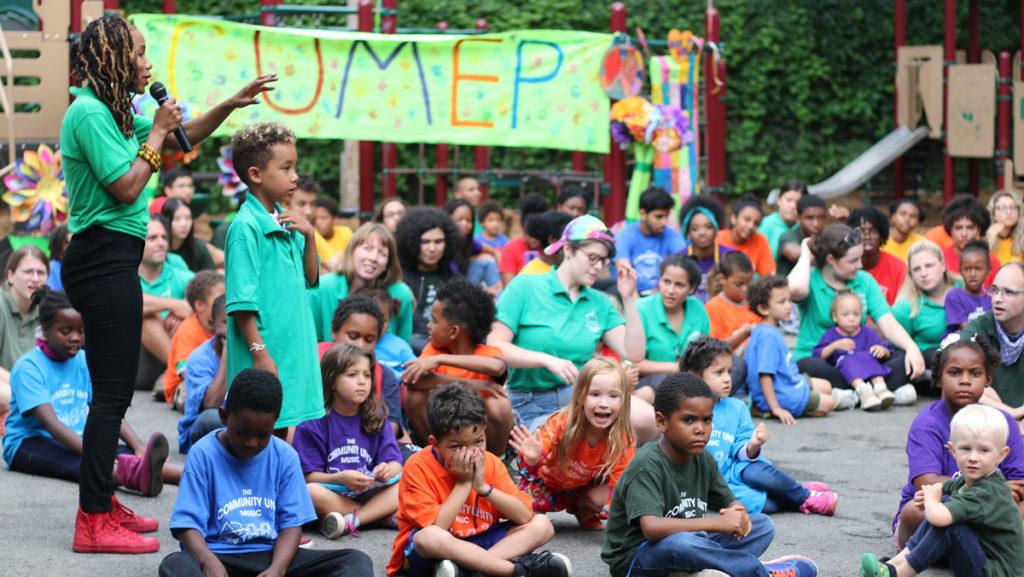The Community Unity Music Education Program (CUMEP) connects Ithaca College with children from the community by teaching social justice through music.
CUMEP, established in 2000, is a nonprofit organization based at the Southside Community Center that exposes kids ages 3–18 to music, art and dance while discussing topics of self-awareness and social justice. The program had its 16th summer session this past July, and students from the college help to run the program.
This year’s session focused on current events like the humanitarian crisis at the U.S.-Mexico border. This session allowed campers to understand the importance of recognizing all people as “100% human,” a call-and-response chant that participants in the program often use. This lesson was coupled with deconstructing teachings of anti-blackness and emphasis on spreading black joy.
Nia Nunn, associate professor in the Department of Education, began running the program in 2007. Her father, Fe Nunn, founded CUMEP to grant children in the community opportunities to learn through music. The program was originally founded as an after school program, and then it became a summer camp in 2003.
Nunn said the major pillars of CUMEP include self-love, self-discovery, developing one’s academic self and civic responsibility.
The 16-day program, running from 8 a.m. to noon Monday through Thursday, brings in 75–100 kids every year. Although there are fees associated with the program, Nunn said the program will not turn people away if they cannot afford the fees.
Nunn said CUMEP openly discusses controversial topics, making the program’s goals of civic duty and engagement clear and unapologetic.
“My whole thing in life is every time I come across any especially nonsense, crazy issues in the world, I’m like, ‘How do you communicate this to a 4 year old?’” Nunn said.
The program has discussed social issues and movements such as the Black Lives Matter Movement, Islamophobia, same-sex marriage and honoring the Cayuga people, on whose land Ithaca was established.
Senior Phoebe Holland was a band teacher at CUMEP this summer. Holland said concepts like black joy are not making their way into classrooms. She said CUMEP helps to bridge this gap. CUMEP discusses subjects that may not be explored in classrooms where teachers may not be fully equipped to do so, Nunn said.
“Even still, our concept of what we want to teach kids are rapidly changing, … but the curriculum isn’t necessarily,” Holland said.
She also said she valued how organized the program was, allowing counselors to genuinely connect with campers. One moment that stuck out to her was when she helped the children compose an original song for them to perform.
The program concludes with a performance on the last day when campers showcase their musical and artistic talents.
Sophomore Gisela Rosa was a counselor at CUMEP and said her first time working with the organization influenced how she views educating children.
“Kids are curious,” Rosa said. “They want to know these things, so you have to talk to them about it.”
Rosa said she thinks teachers should be held accountable for building meaningful curriculums and forming strong relationships students.
“I feel like a lot of teachers just go to class to teach because that’s their job, not because they want to sit there and understand the child,” Rosa said.
Nunn said she plans to include new lessons such as farming while black — healing black people’s trauma with the land and learning to raise their own produce — and the importance of financial freedom and making smart choices with money. Nunn also said the curriculum is flexible to current events.
Nunn said there is hope in educating youth on topics that may otherwise be considered taboo in some households.
“It’s the kids,” Nunn said. “They are ready. They’re so ready. We just have to give them the tools on how to navigate that.”








